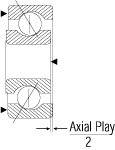| Available Bearings | Bearing Selector | Technical Info | New Products | |||
Bearing Pitch Diameter Information || Dynaroll's Technical Overview of Bearings
BEARING PITCH DIAMETER
AVAILABLE BEARINGS
Inch Precision
Metric Precision
600 Series
6000 Series
6200 Series
6300 Series
6800 Series
6900 Series
R Series
Thrust Bearings
Stainless Steel Thrust Bearings
Thin Section Bearings
Collar Bearings
Flangette Collar Bearings
Inch Precision
Metric Precision
600 Series
6000 Series
6200 Series
6300 Series
6800 Series
6900 Series
R Series
Thrust Bearings
Stainless Steel Thrust Bearings
Thin Section Bearings
Collar Bearings
Flangette Collar Bearings
SPECIFY A BEARING
Specify by Type
Specify by Desired Dimensions
Specify by Cross-Reference
Specify by Known Part Number
Part Numbering System
Specify by Type
Specify by Desired Dimensions
Specify by Cross-Reference
Specify by Known Part Number
Part Numbering System
BEARING PITCH DIAMETER
Bearing
Pitch Diameter - Bearing
Dynamics - Bearing
Geometry.
When a bearing is running under load, force is transmitted from one bearing raceway to the other through the balls. The contact area between a ball and the raceway (contact ellipse) may be very small, so that even moderate loads can produce very large stresses. These stresses can affect bearing performance and life dramatically, so that it is important to consider the internal geometry of the bearing before making a selection for a given application.
When a bearing is running under load, force is transmitted from one bearing raceway to the other through the balls. The contact area between a ball and the raceway (contact ellipse) may be very small, so that even moderate loads can produce very large stresses. These stresses can affect bearing performance and life dramatically, so that it is important to consider the internal geometry of the bearing before making a selection for a given application.
RACEWAY CURVATURE
Raceway curvature ratio (f) is the ratio of the raceway radius (R) to the ball diameter (Dw).

Inner
raceway curvature ratio fi = |
|
where: |
Dw
= ball diameter Ri = inner raceway radius Ro = outer raceway radius |
|||
Outer raceway
curvature ratio fo = |
|
|||||
| fi, fo values are typically 0.56 ± 0.03 for small bearings where low torque is a primary requirement. It is not necessarily the same for both inner and outer raceways. Raceway curvature ratio is often referred to as a percentage f x 100%. | ||||||
The total curvature of a bearing is
defined as B = fi
+ fo
- 1
RADIAL AND AXIAL PLAY
| Bearings are assembled with a slight amount of looseness between the balls and the raceways. This allows the bearing to rotate smoothly but also affects the performance of the bearing in a given application. This looseness can be split into two components - radial and axial play. | |
RADIAL
PLAY is the maximum displacement
that one bearing ring can be displaced relative to the other
ring in a direction perpendicular to the axis of rotation of
the bearing. |
 |
| AXIAL PLAY,
or end play, is the maximum relative displacement of the bearing
rings, in a direction parallel to the axis of rotation. Axial
play = ∆a |
 |
| Radial and axial play are
interdependent and are determined during the manufacture of the
bearing. Typically, radial play is a purchasing specification. |
|
